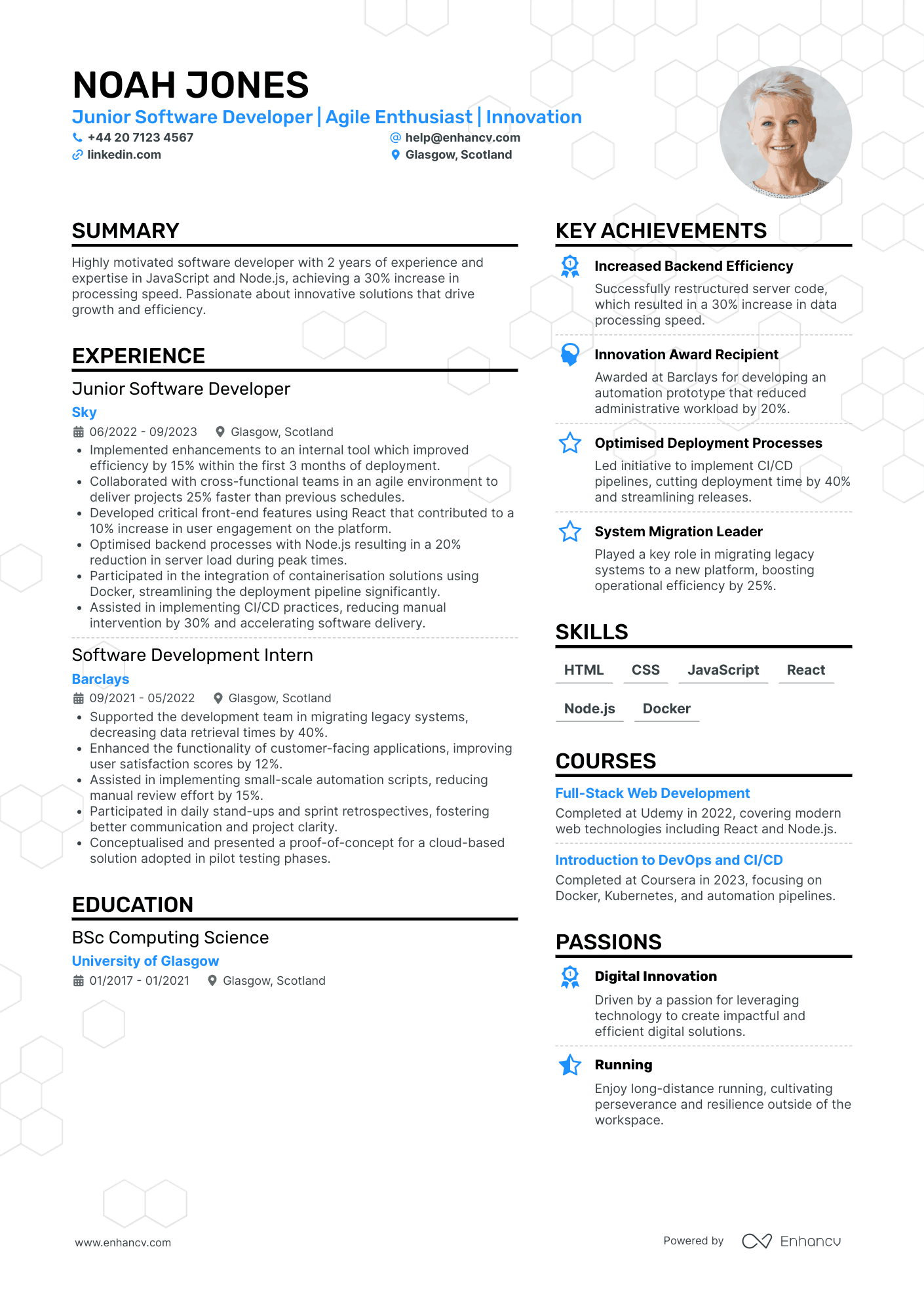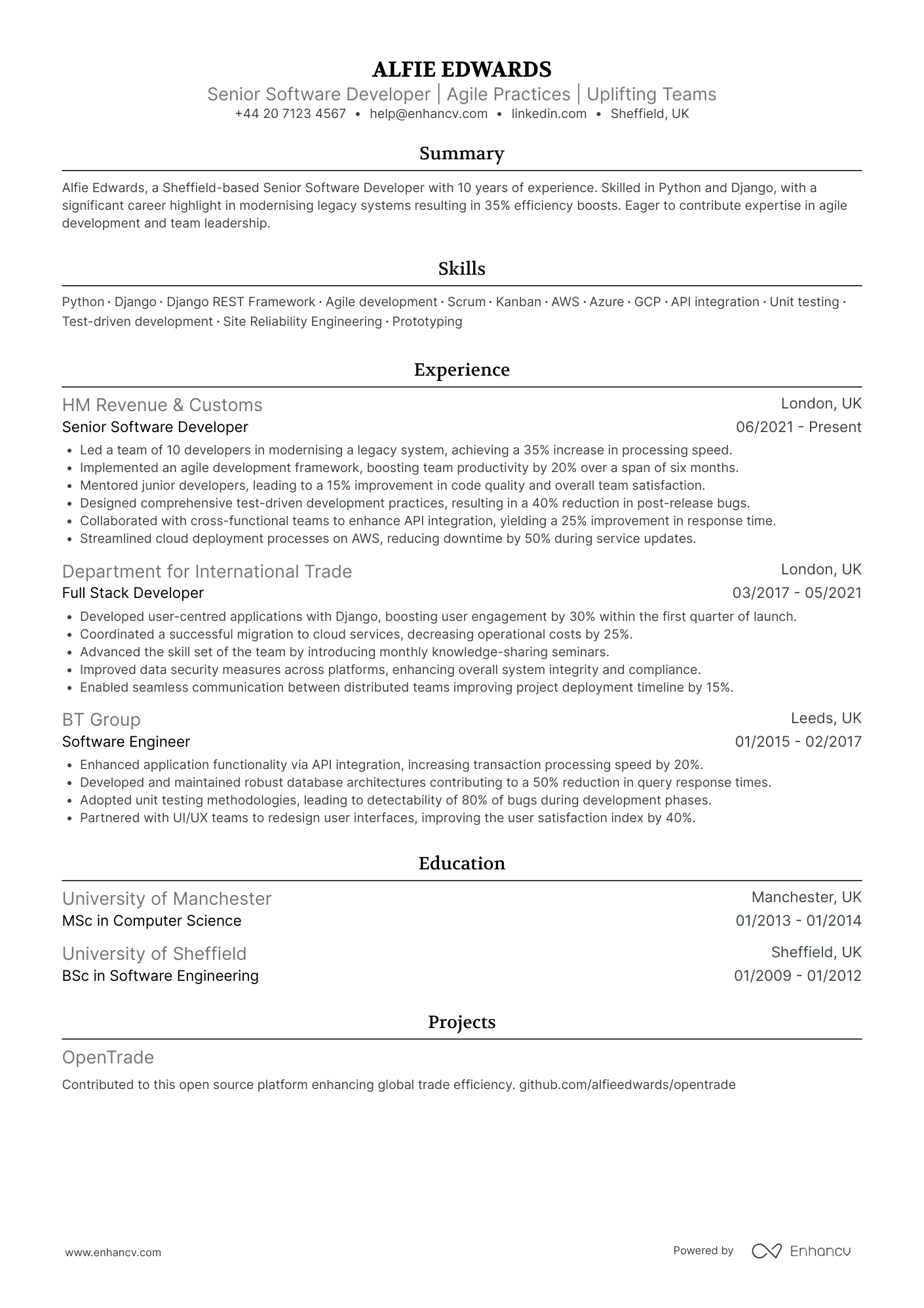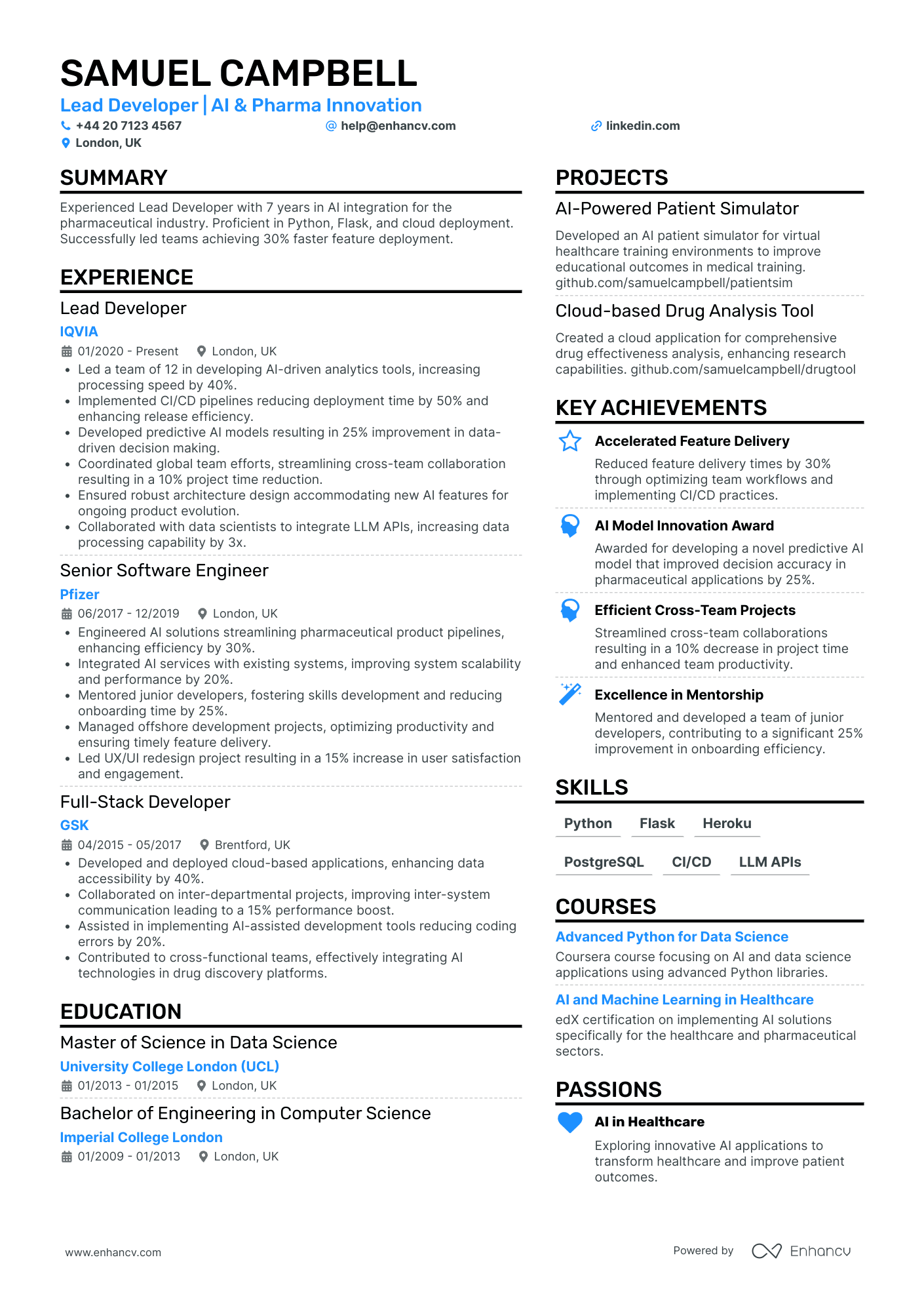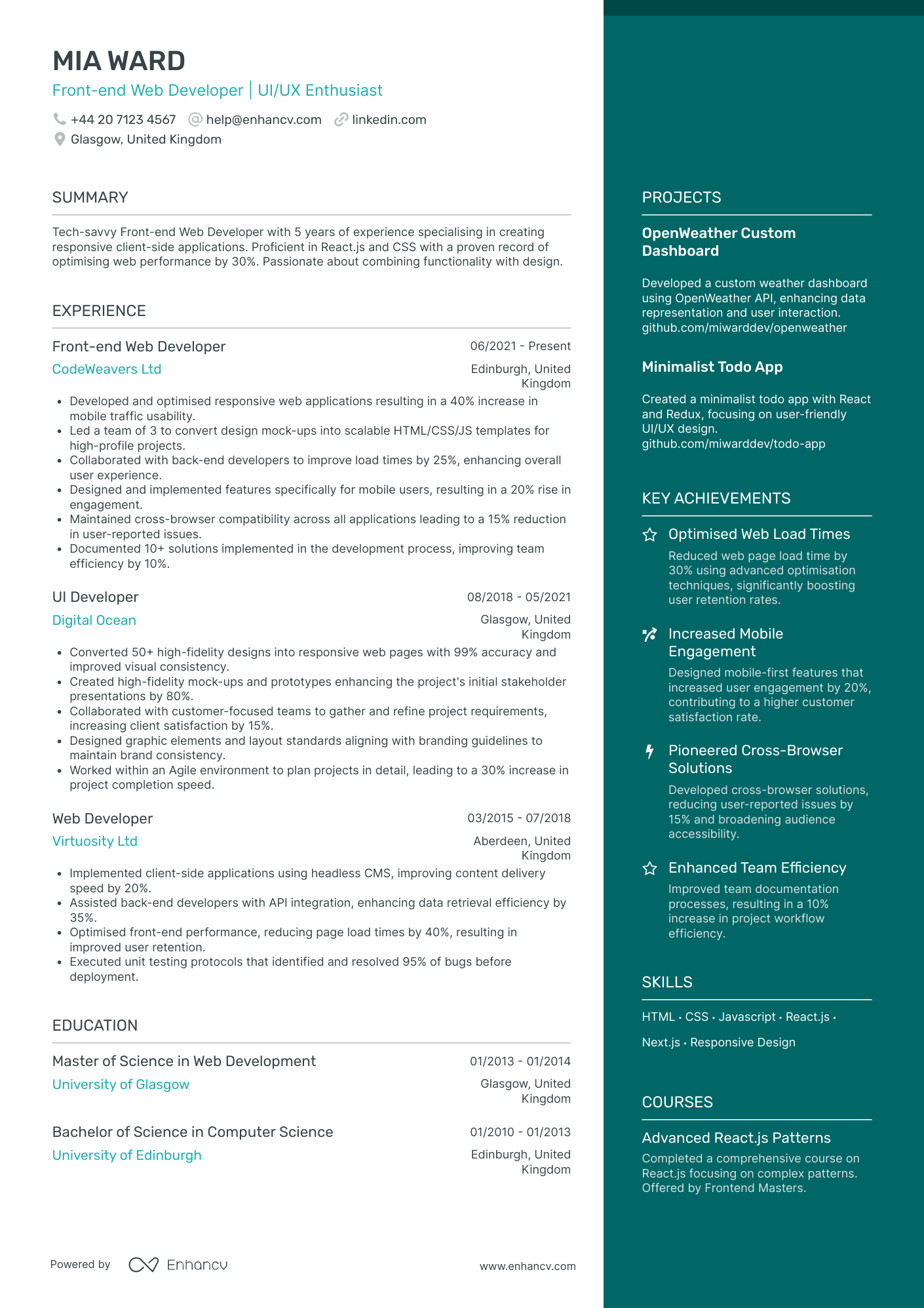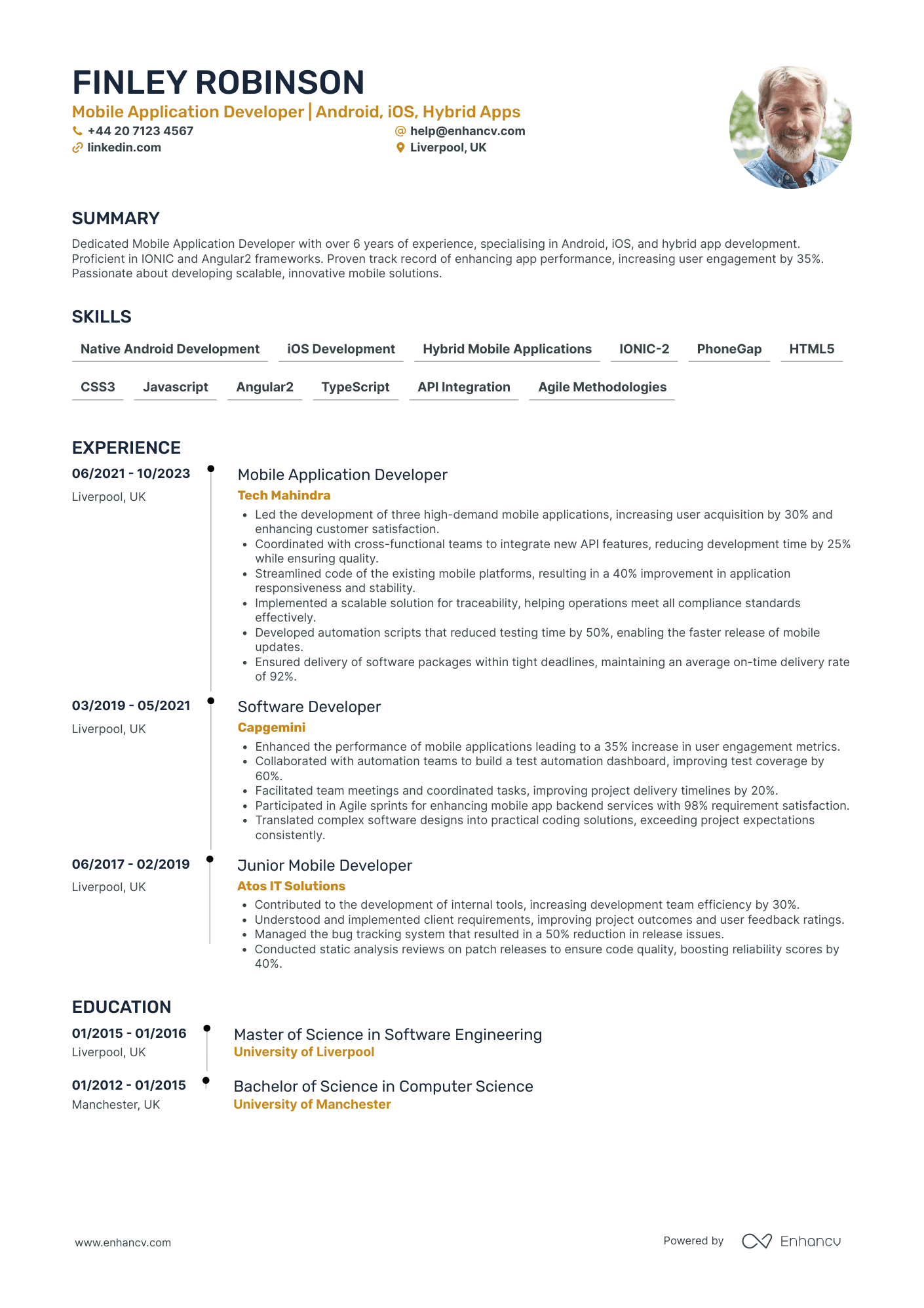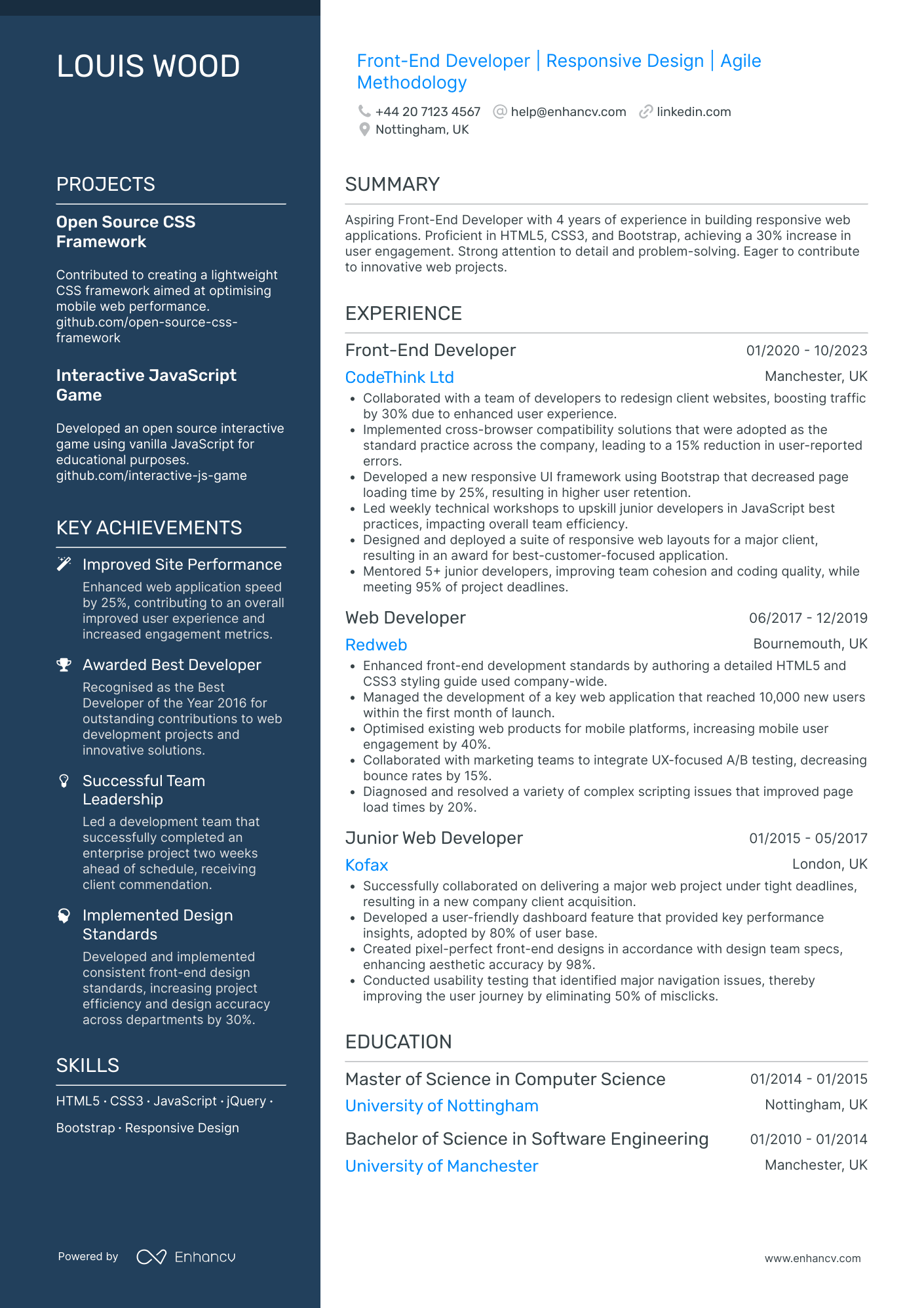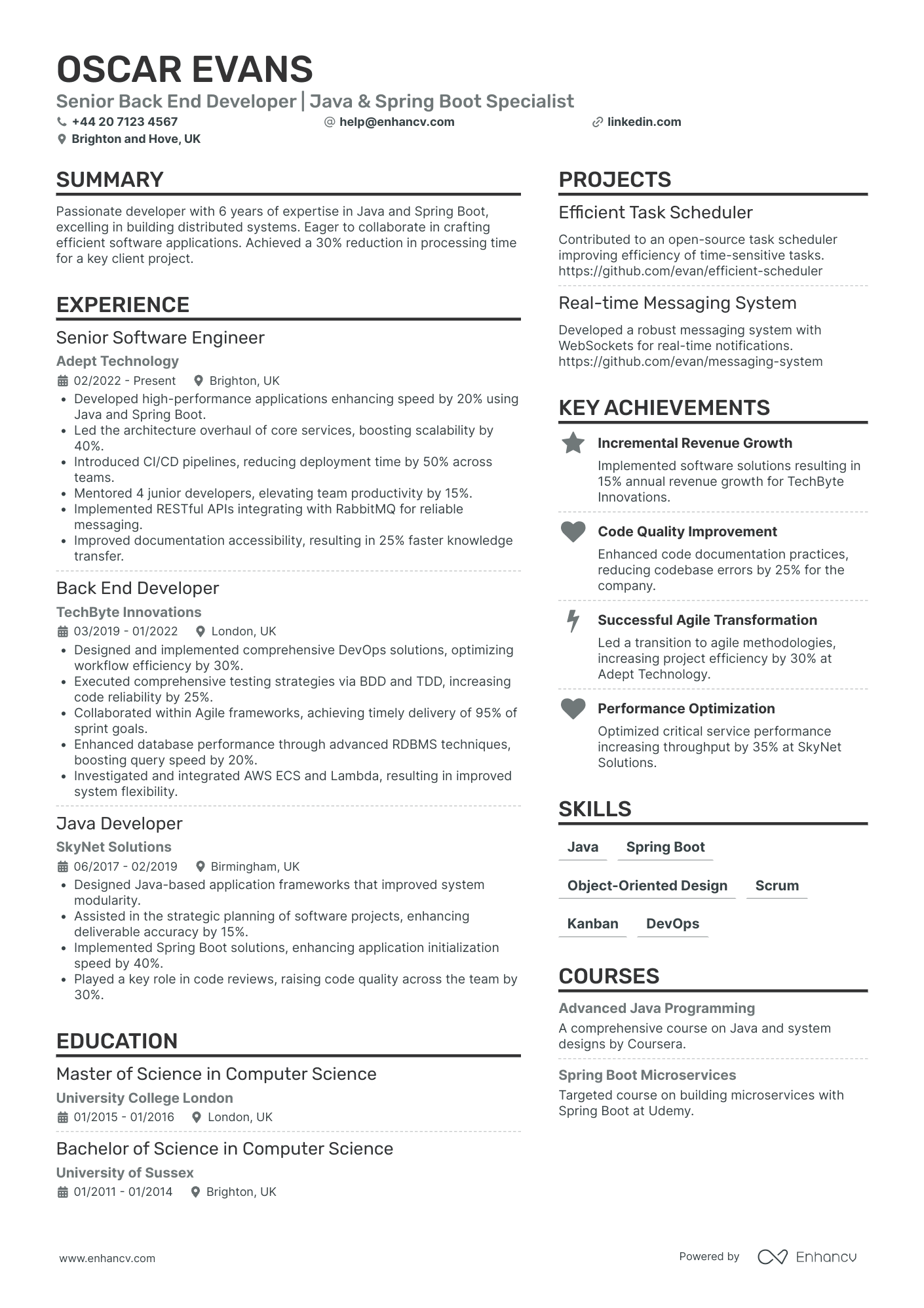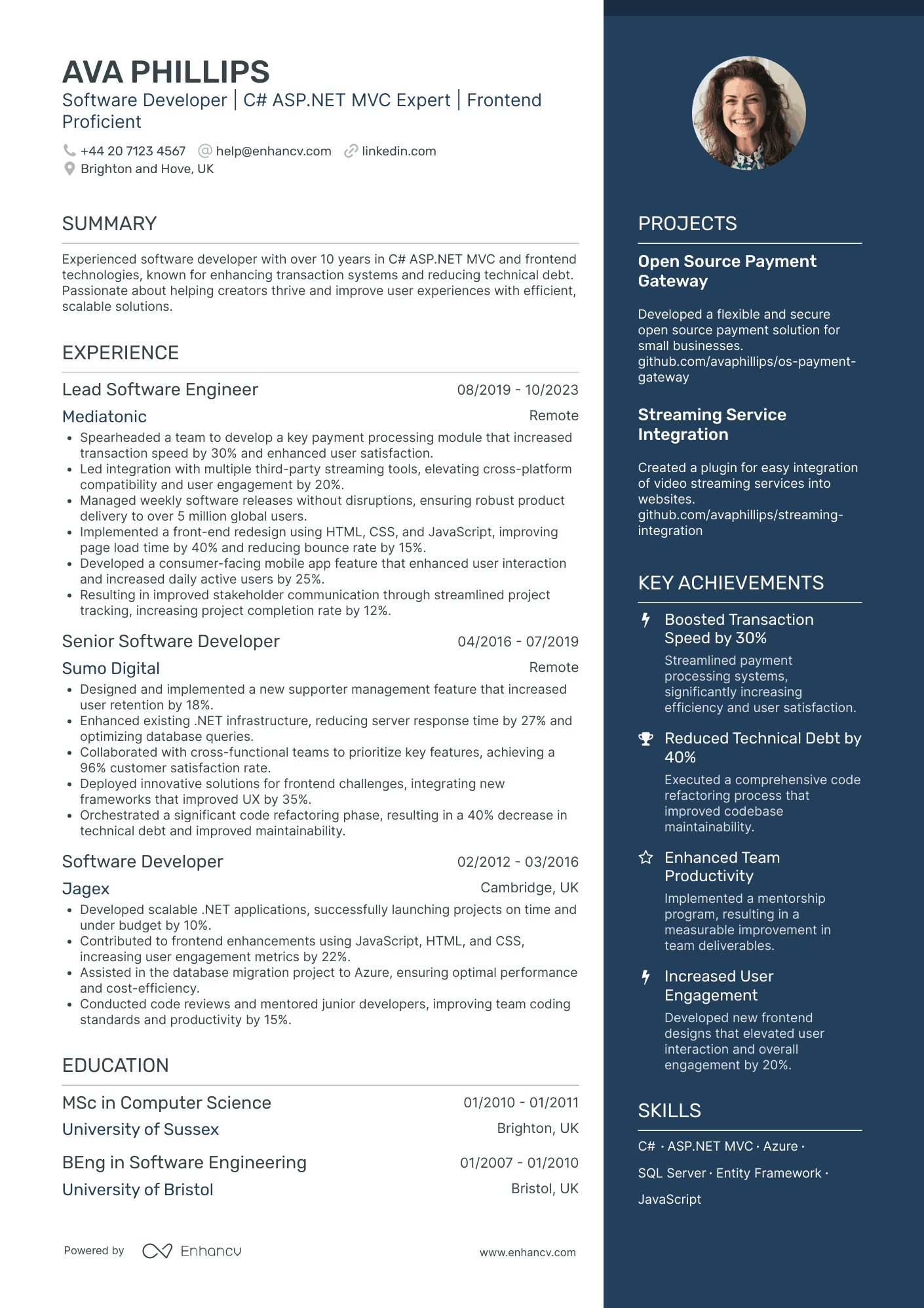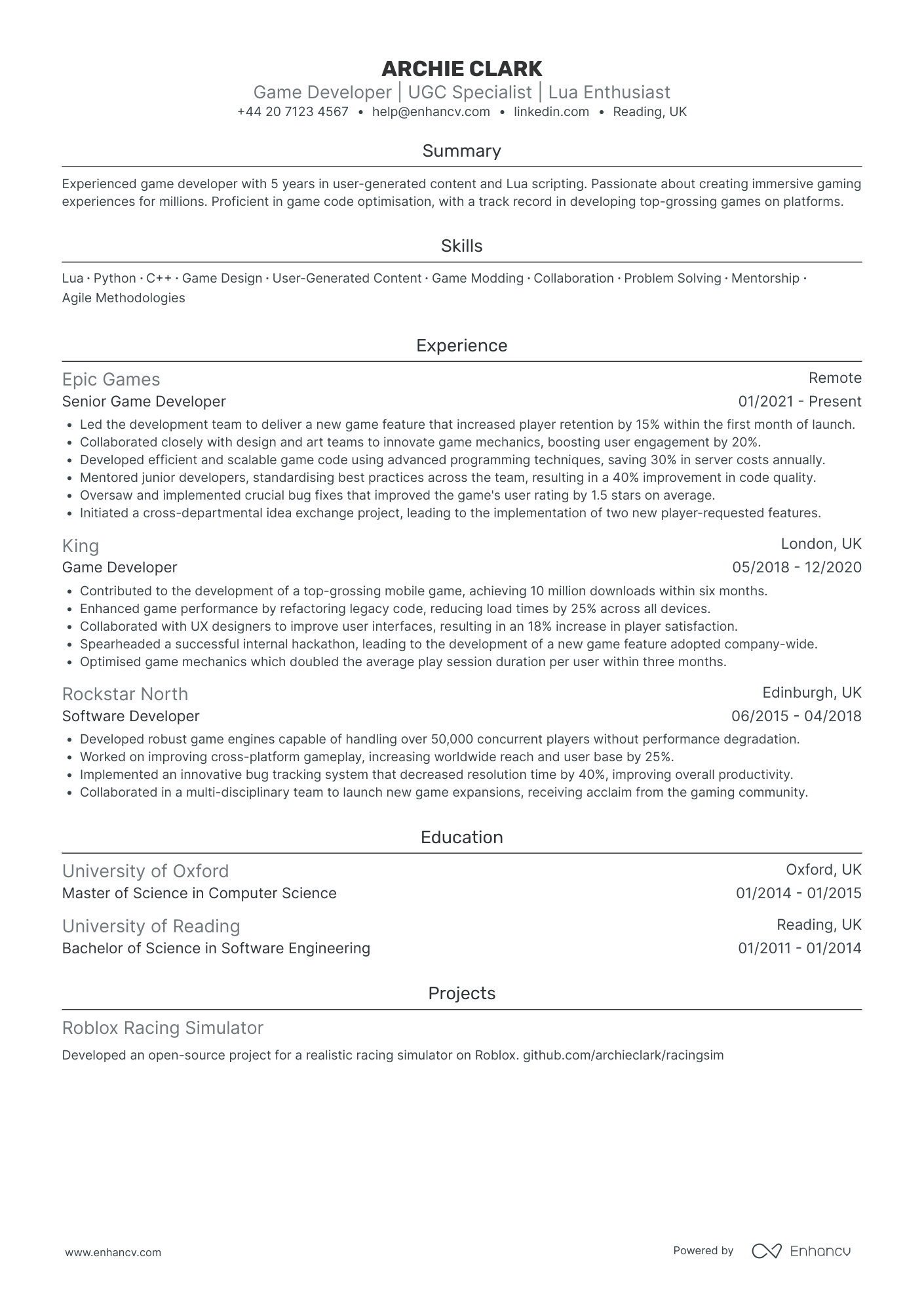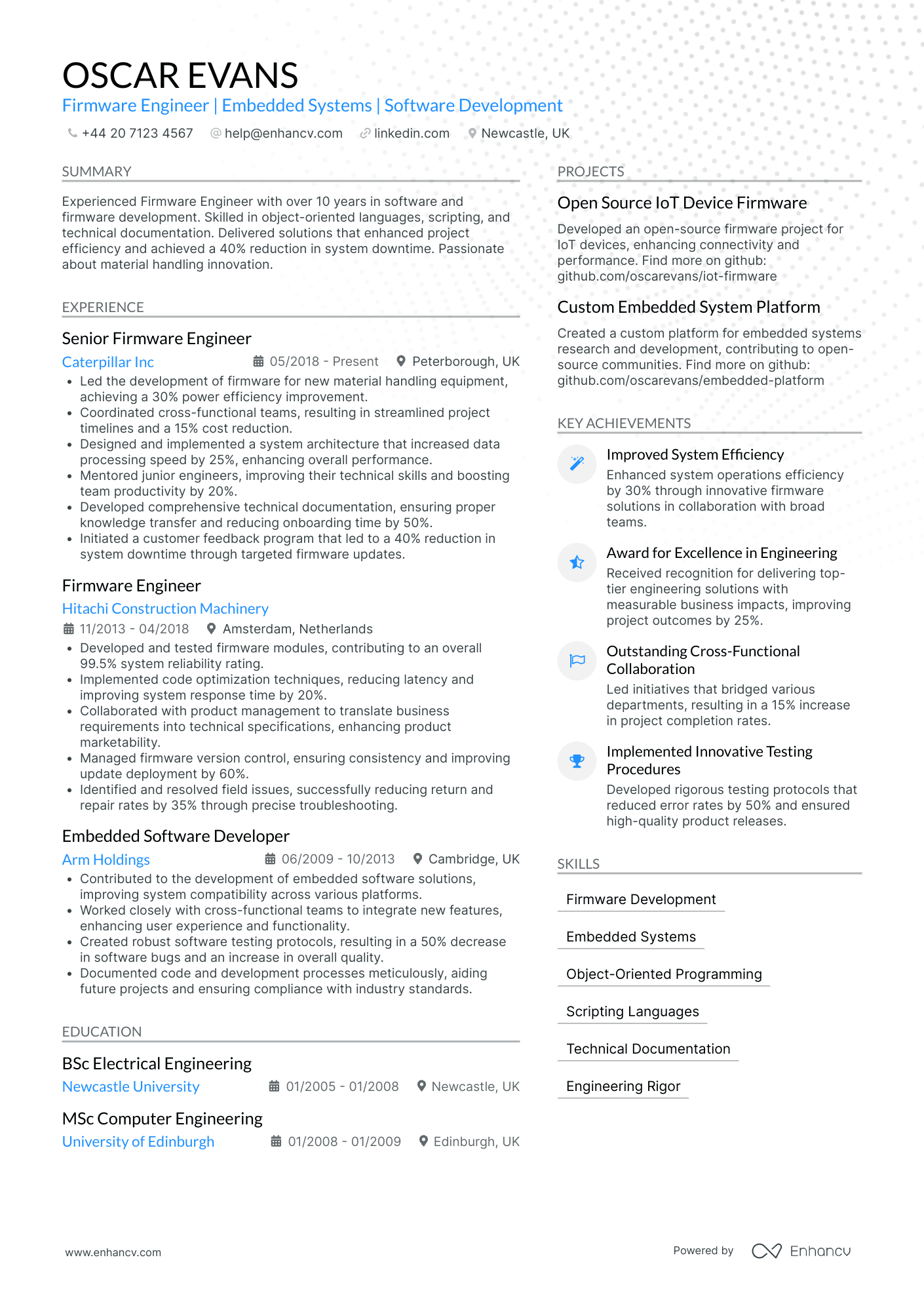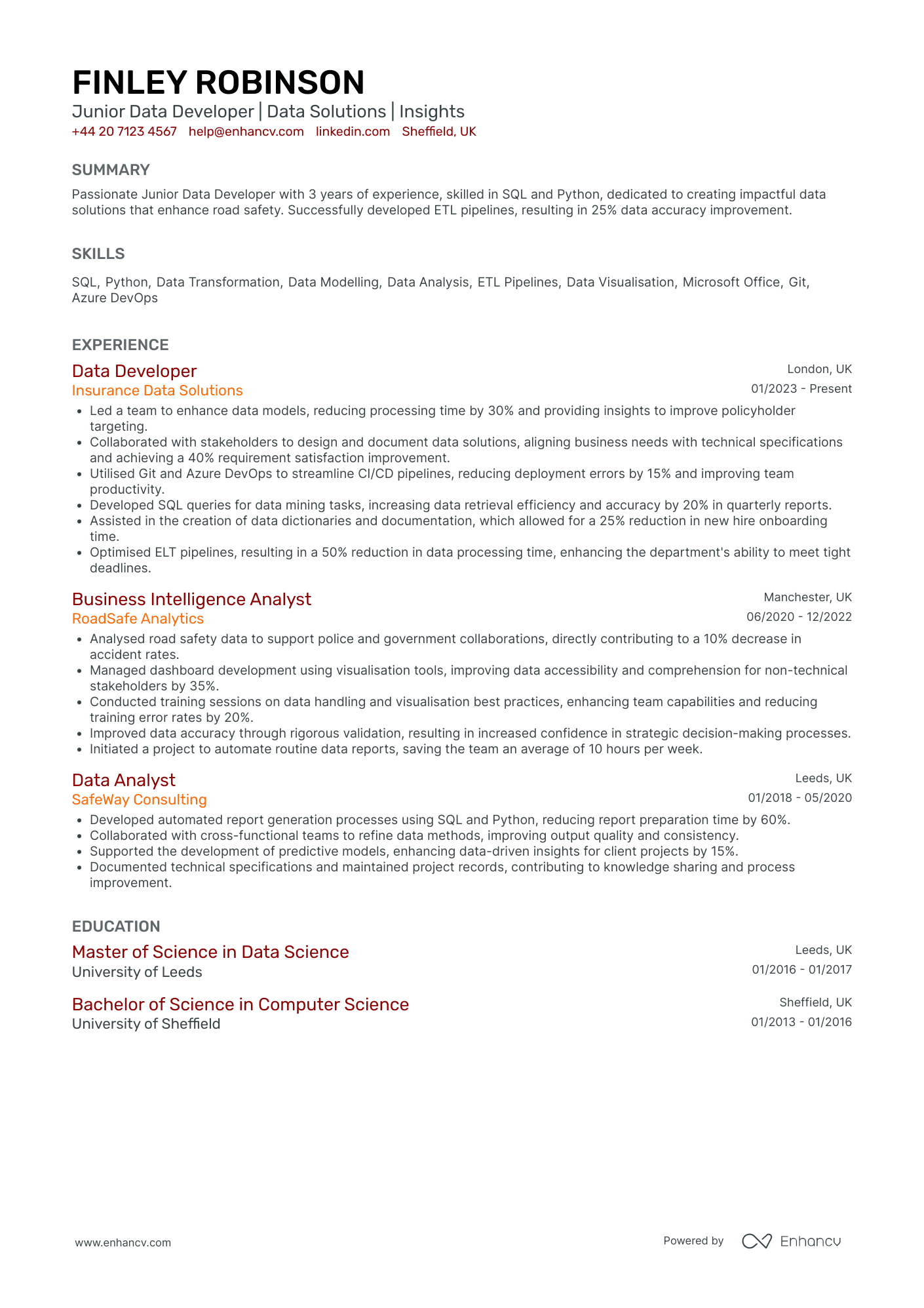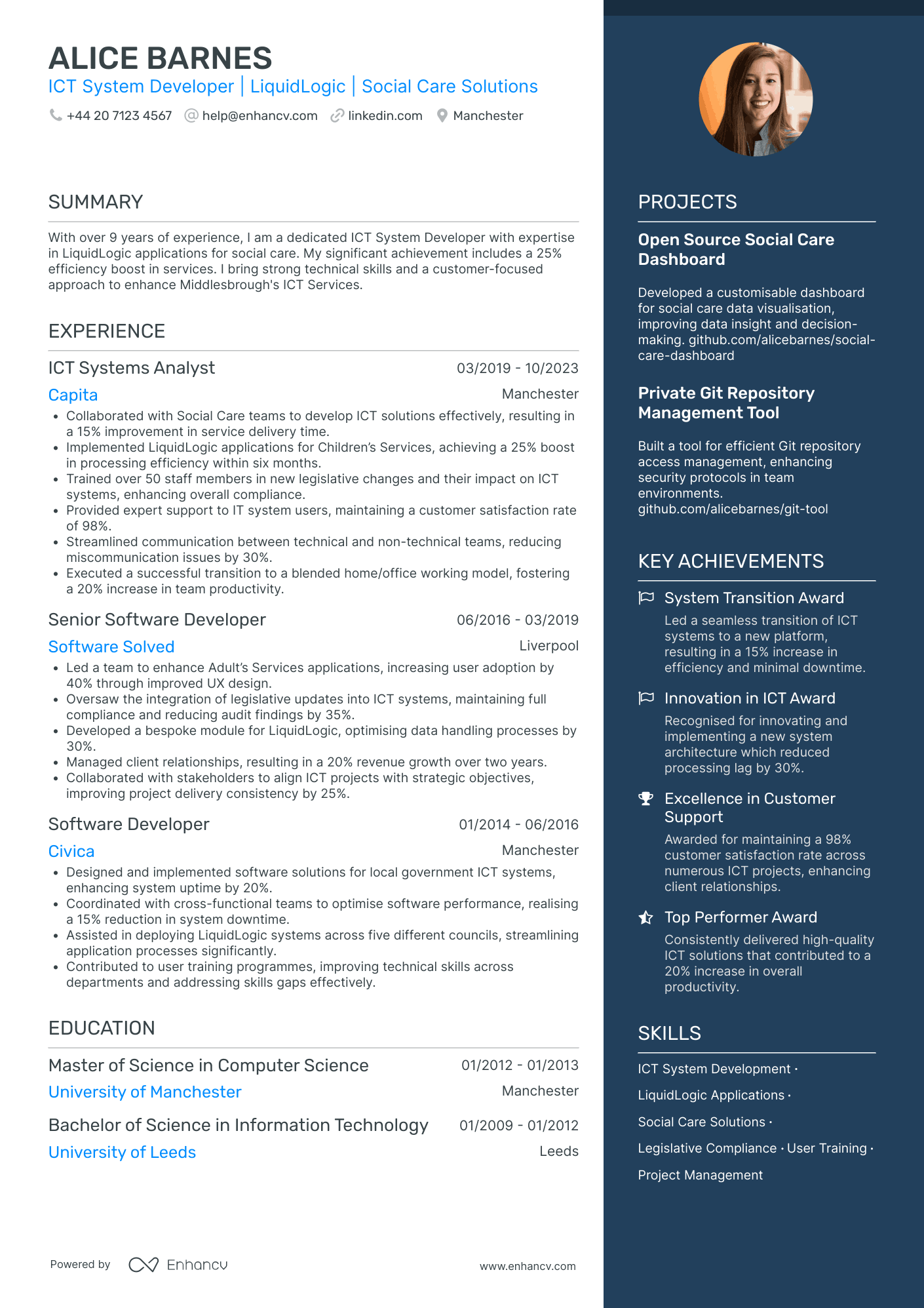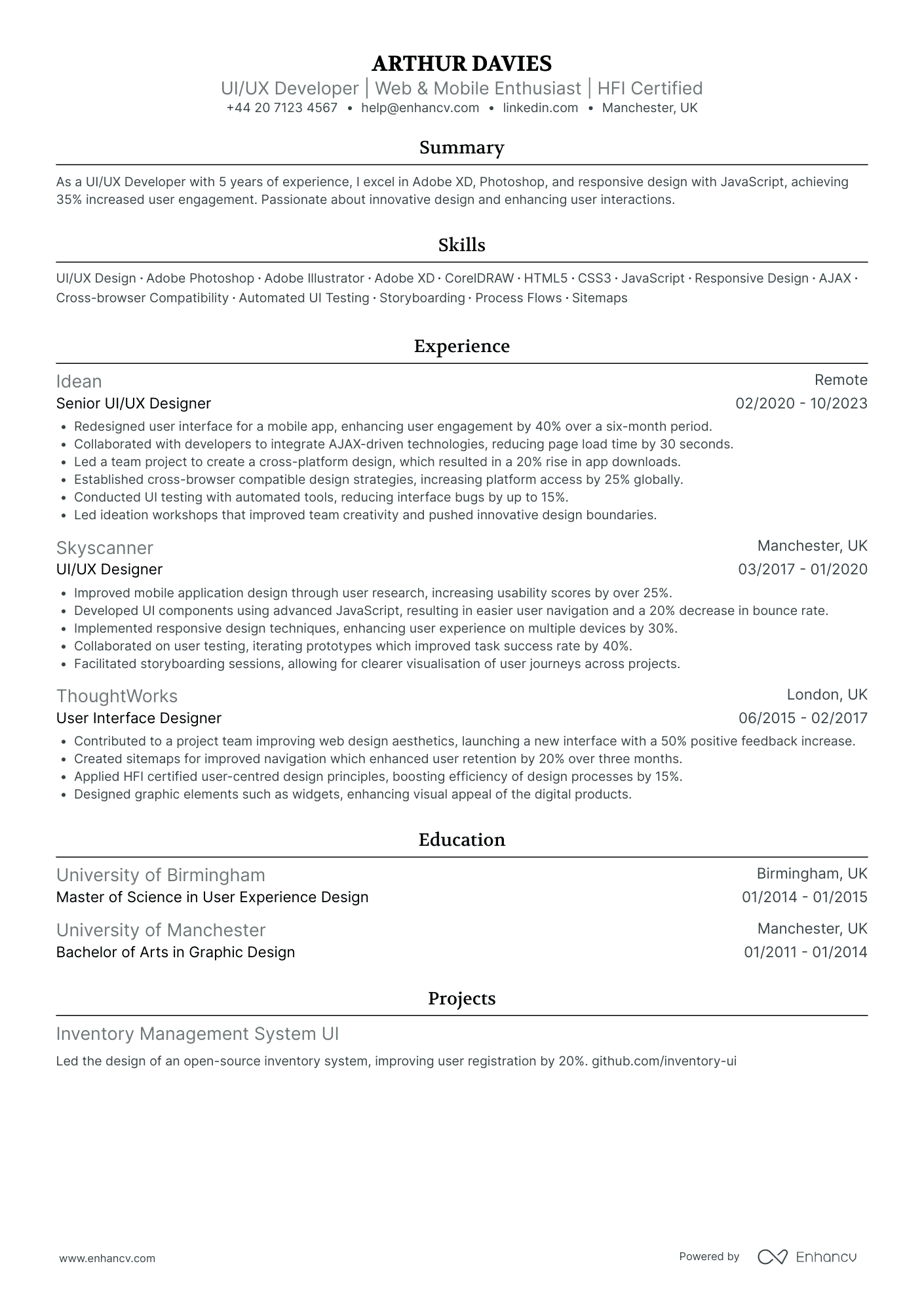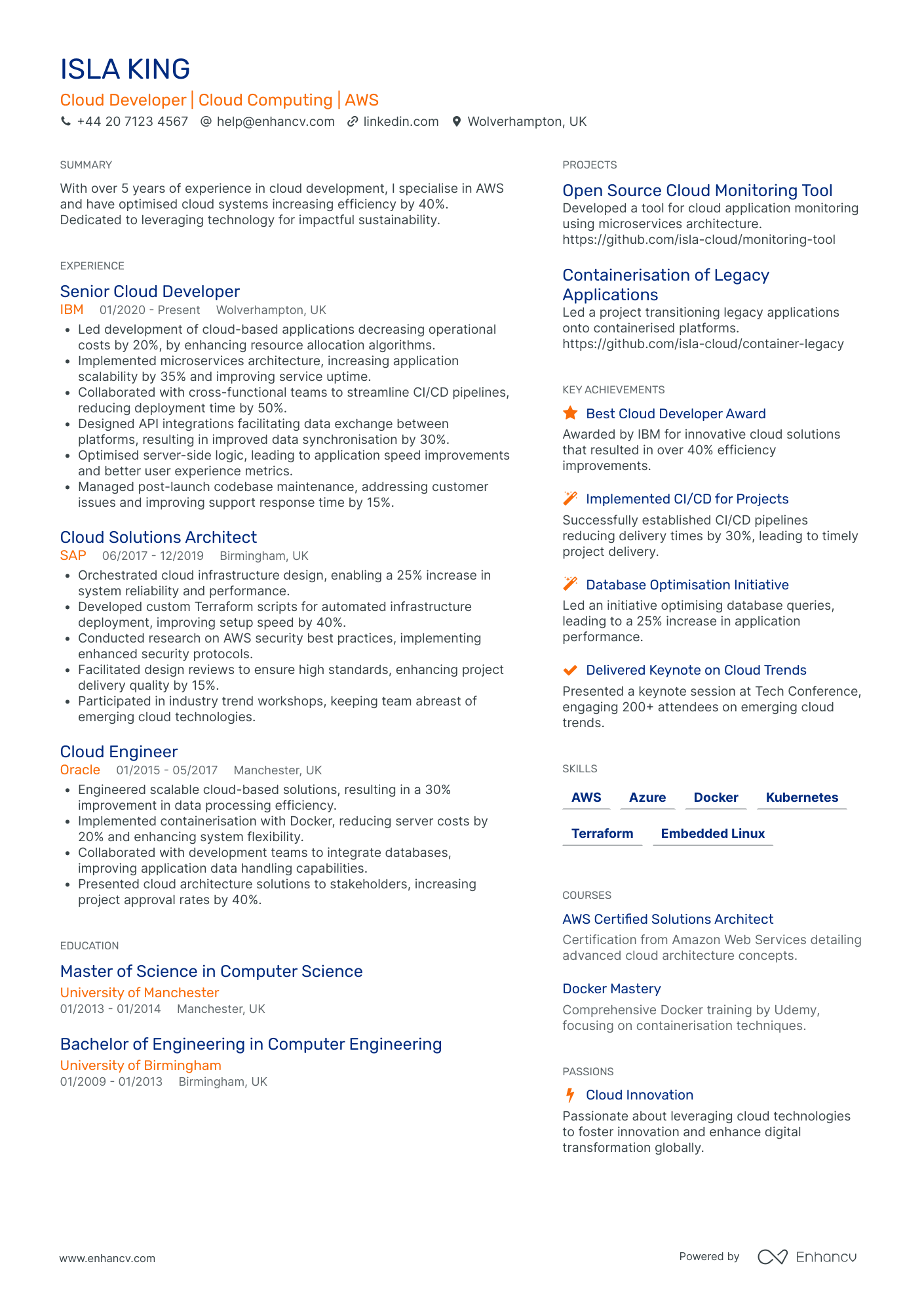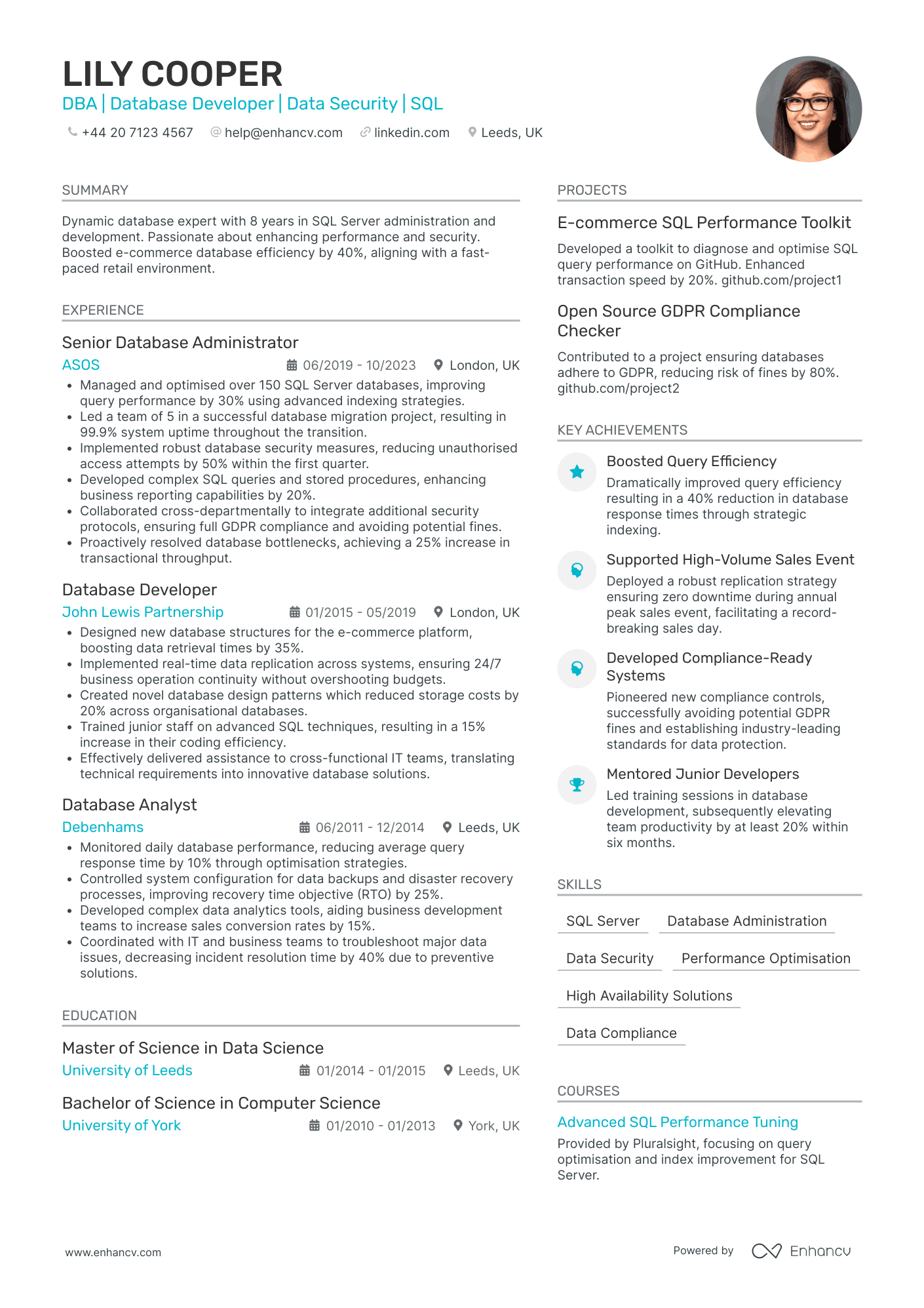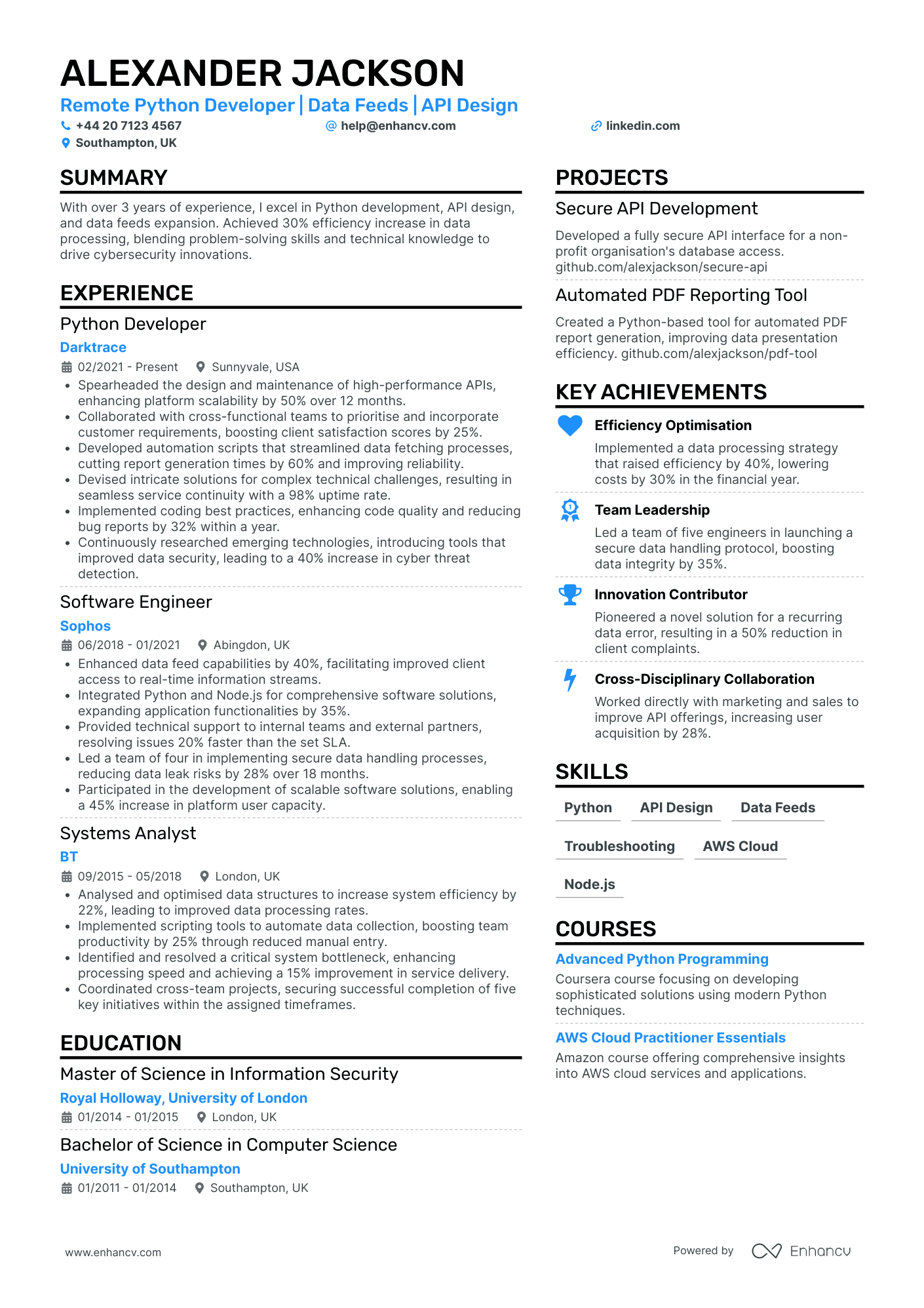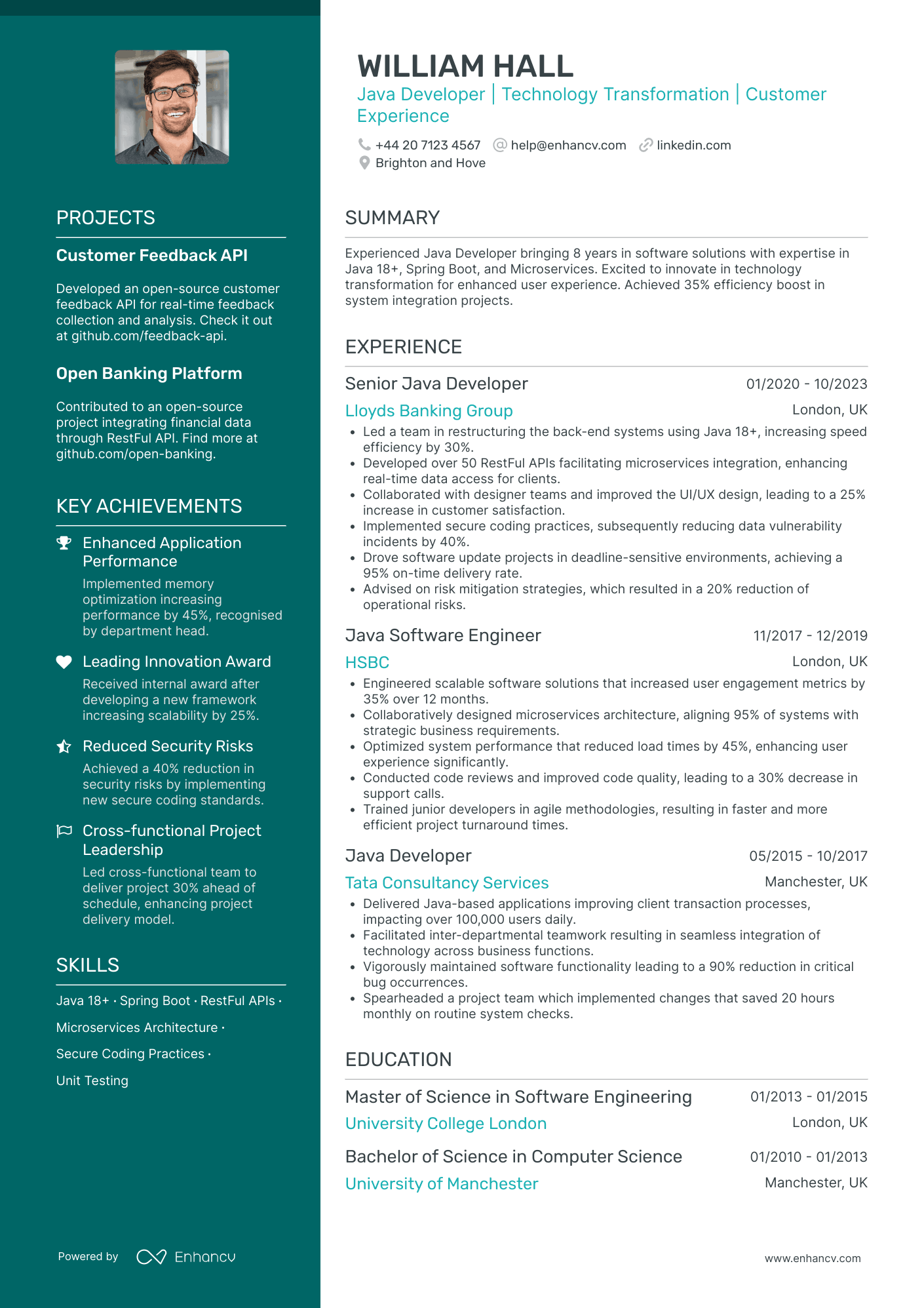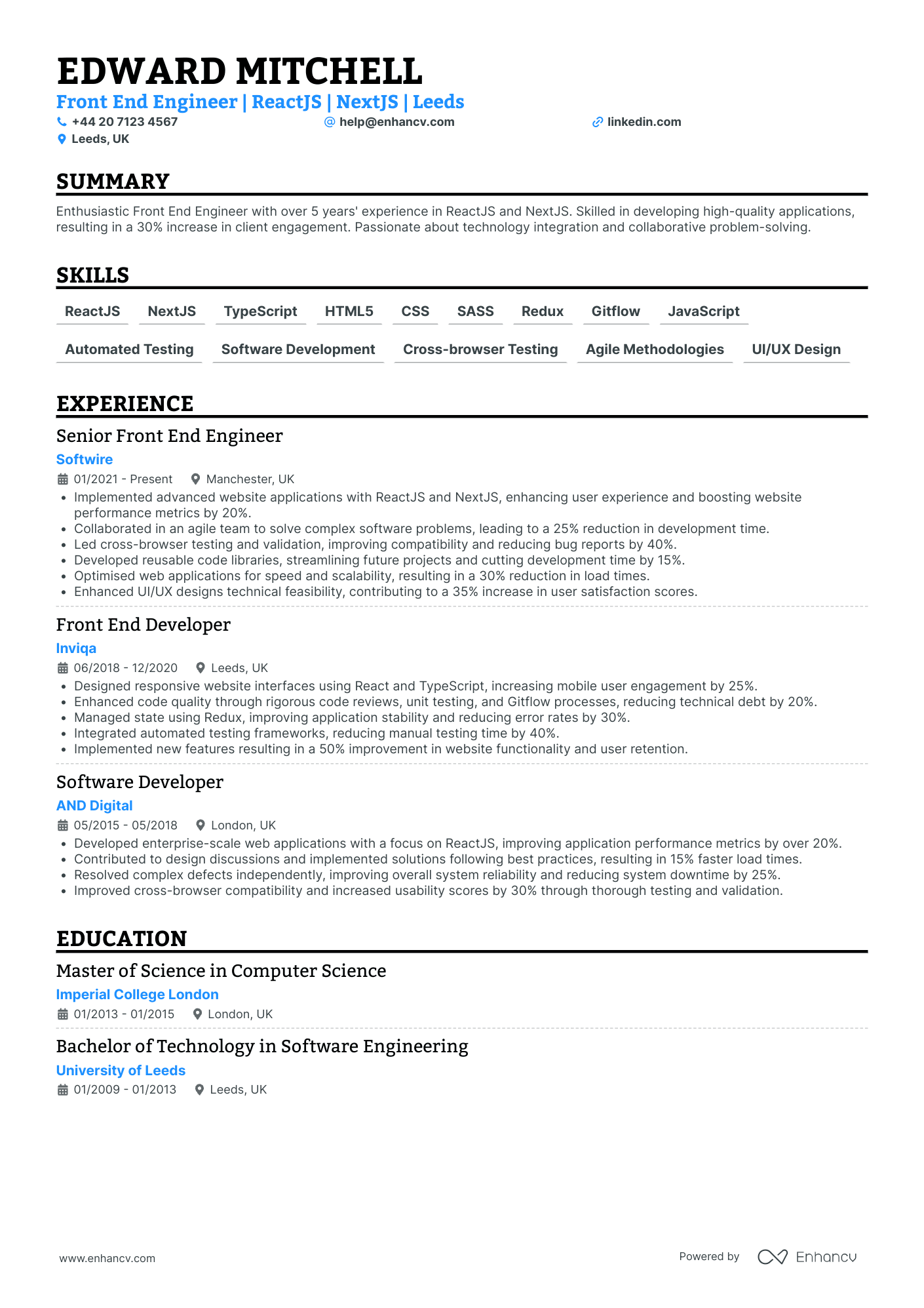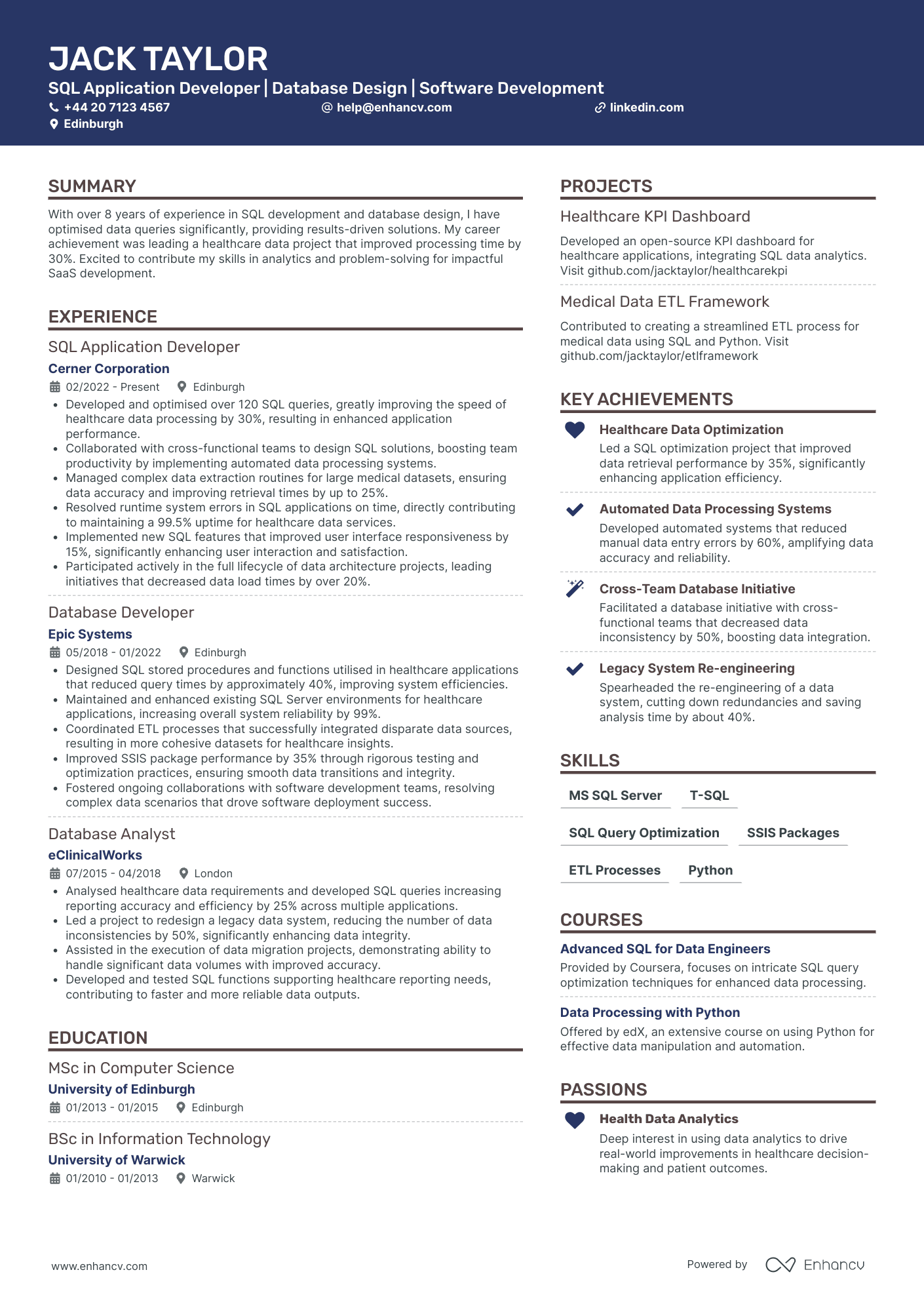One of the specific CV challenges you might face is articulating your diverse programming skills in a manner that stands out to potential employers. Our guide provides expert tips on structuring your CV effectively, ensuring that your technical expertise is highlighted and easily navigable.
- Applying the simplest CV design, so that recruiters can easily understand your expertise, skills, and professional background;
- Ensuring you stand out with your header, summary or objective statement, and a designated skills section;
- Creating your CV experience section - no matter how much expertise you have;
- Using real life professional CV examples to enhance the structure and outline of your profile.
If you still have no muse to write your professional CV, find some more industry-leading examples.
CV examples for developer
By Experience
Junior Software Developer
- Structured for Clarity and Impact - The CV is meticulously organized with distinct sections for personal information, professional experience, education, and skills. Each section is clearly labeled and concise, allowing potential employers to quickly grasp the key points. Bullet points are used effectively to present information in a digestible manner, enhancing readability and making the content both structured and engaging.
- Illustrates Remarkable Career Growth - The document highlights a clear upward trajectory with consistent promotions over the years, reflecting recognition of the candidate's dedication and ability. It captures industry shifts from traditional marketing roles to high-level strategic positions in modern digital-focused companies, demonstrating adaptability and foresight in career development.
- Showcases Advanced Technical Competence - Industry-specific tools and methodologies such as Python for data analytics, advanced SEM strategies, and the use of cutting-edge marketing automation platforms are prominently featured. This depth of technical knowledge not only underscores the candidate's expertise but also indicates their capability to implement sophisticated solutions in a rapidly evolving field.
Senior Software Developer
- Effective Use of Section Headers - The CV is well-organized, with distinct sections such as "Professional Experience," "Skills," "Education," and "Certifications" that allow the reader to quickly locate relevant information. Each section is clearly defined, making the document easy to navigate and understand.
- Demonstrated Career Growth and Adaptability - The CV outlines a progressive career trajectory, showing a clear path from entry-level roles to positions of greater responsibility. Notably, it reflects how the candidate has successfully transitioned between different sectors within the tech industry, emphasizing an ability to adapt to new challenges and environments.
- Showcases Mastery of Industry-Specific Tools - The skills section lists a wide range of industry-standard tools and technologies, highlighting the candidate's proficiency in software like Python, Tableau, and SQL. This technical depth illustrates their capability to handle complex data and analytics tasks, critical for roles in data-driven environments.
Lead Developer
- Structured clarity in presentation - The CV offers a clear and concise structure, which aids in quick comprehension of Samuel Campbell's professional journey. Each section is well-organized with bullet points that succinctly highlight his contributions and achievements. This approach ensures that important details are easily accessible, enhancing the overall readability of the document.
- Diverse career growth in the pharmaceutical industry - Samuel's career trajectory demonstrates considerable growth within the pharmaceutical sector, marked by progressive roles from Full-Stack Developer at GSK to Lead Developer at IQVIA. His experience reflects a consistent upward shift in responsibilities and leadership, indicating significant professional development and an ability to adapt within the industry.
- Technical depth with industry-specific tools - The CV showcases Samuel’s proficiency in specialized tools and methodologies relevant to AI in the pharmaceutical industry, such as LLM APIs and AI-assisted Development. His experience with cloud deployment and predictive AI models indicates a deep technical understanding, critical for innovation in pharma tech. This depth is further supported by his targeted education and certifications in Data Science and AI applications in healthcare.
By Role
Web Developer
- Strong Technical Proficiency - Mia Ward's CV highlights an impressive technical skill set, showing depth in modern web development tools and frameworks such as React.js, Next.js, and CSS. Her proficiency with headless CMS and experience in web performance optimization indicate a robust capability to handle complex web applications effectively.
- Clear Professional Growth - The CV displays a clear career trajectory, moving from a role as a Web Developer to a Front-end Web Developer. This progression reflects a deepening specialization in front-end technologies and UI/UX, showcasing Mia's upward mobility and increasing responsibility within her roles.
- Effective Leadership and Collaboration - Mia has demonstrated her leadership skills by leading a team in converting design mock-ups into scalable projects, and her collaboration with back-end developers showcases her ability to work cross-functionally. These experiences reflect an ability to manage and work efficiently within a team environment, enhancing productivity and outcomes.
Mobile Application Developer
- Comprehensive Career Progression - Finley Robinson's CV clearly depicts a well-defined career trajectory, advancing from a Junior Mobile Developer to a Mobile Application Developer. This upward growth is indicative of consistent performance and skill enhancement, showing a commitment to professional development within the mobile application industry.
- Technological Expertise and Innovation - The CV is rich in industry-specific jargon, showcasing expertise in a range of tools like IONIC-2, PhoneGap, Angular2, and TypeScript. These technical skills highlight Robinson's depth of knowledge in both native and hybrid mobile application development, demonstrating the ability to innovate and adapt within this rapidly evolving field.
- Impressive Quantifiable Achievements - The CV effectively emphasizes Robinson's significant contributions through demonstrable numbers, such as a 30% increase in user acquisition and a 50% reduction in testing time. These metrics not only highlight his competence but also underscore the direct business impact of his efforts, proving his value to prospective employers.
Front-end Developer
- Comprehensive Career Growth - Louis Wood's career trajectory demonstrates a clear path of progression, beginning as a Junior Web Developer and advancing to his current role as a Front-End Developer. Each position outlines increased responsibility, such as mentoring junior developers and leading workshops, showcasing both career growth and a commitment to professional development.
- Specialized Skills in Responsive Design - The CV highlights Louis's proficiency in cutting-edge front-end tools and methodologies such as HTML5, CSS3, Bootstrap, and JavaScript. By focusing on responsive design standards and agile methodology, it underscores a deep technical expertise crucial to creating user-friendly, accessible web applications.
- Impact-Driven Achievements - The document features concrete achievements that have significantly impacted business metrics. For instance, implementing cross-browser compatibility solutions led to a 15% reduction in user-reported errors, while a new responsive UI framework decreased page loading time by 25%, illustrating his substantial contributions to organizational goals and user satisfaction.
Back-end Developer
- Structured and Focused Presentation - The CV stands out with its well-organized format, using clear headings and concise bullet points that allow easy navigation through Oscar Evans's experience and achievements. This clarity is crucial for quickly conveying his qualifications to potential employers.
- Strong Career Progression - Oscar's career shows a steady growth trajectory, moving from a Java Developer to a Senior Back End Developer. This path not only highlights his increasing responsibilities and expertise in Java and Spring Boot but also his ability to excel in dynamic, tech-driven environments across various cities in the UK.
- Strategic Impact on Business Performance - The CV emphasizes achievements that go beyond mere technical endeavors by showcasing significant business impacts such as optimizing revenue growth by 15% and increasing project efficiency by 30%. These accomplishments display Oscar’s capability to contribute to and improve business operations through technology.
Full Stack Developer
- Structured and Detailed Presentation - The CV is organized into clear sections, enhancing readability and allowing easy navigation through professional history, skills, and achievements. Each job experience includes concise bullet points detailing specific responsibilities and results, highlighting Ava's direct impact on projects and team performance.
- Progressive Career Trajectory - Ava Phillips shows a steady climb from a Software Developer role at Jagex to a Lead Software Engineer at Mediatonic, reflecting growth in responsibility and expertise. This trajectory signals her ability to adapt and excel in varied roles within the software development field, consistently taking on more complex challenges.
- Showcasing Technical Expertise - The CV emphasizes Ava’s deep technical skills with tools and methodologies specific to modern software engineering. Noteworthy is her mastery of C#, ASP.NET MVC, and her experience with frontend technologies, making her a versatile developer capable of handling both backend and frontend challenges efficiently.
Game Developer
- Structured Presentation of Expertise - The CV is expertly structured, providing a concise and clear outline of Archie's core competencies in game development, user-generated content, and Lua scripting, right from the header. This immediately sets the tone for the reader, highlighting the key skills and interests at a glance.
- Progressive Career Growth - Archie's career path reflects significant progression, highlighting a shift from a Software Developer role at Rockstar North to a Senior Game Developer position at Epic Games. This trajectory not only underscores their personal growth but also illustrates their increasing responsibility and expertise in the industry.
- Rich Industry-Specific Acumen - The CV is rich in industry-specific tools and methodologies, with a heavy emphasis on advanced programming techniques and game code optimization. It demonstrates Archie's technical depth through detailed accounts of collaboration on cross-platform gameplay and the development of scalable game engines.
Embedded Systems Developer
- Clear Content Structure - The CV is organized with distinct sections such as experience, education, skills, and achievements, allowing for easy navigation. Each section is well-structured with concise bullet points that effectively convey detailed accomplishments and responsibilities.
- Impressive Career Growth - Oscar Evans shows a clear trajectory of growth from an Embedded Software Developer to a Senior Firmware Engineer. This progression within leading companies highlights significant professional development and increasing responsibilities.
- Technical Expertise in Firmware and Embedded Systems - The CV highlights industry-specific skills such as firmware development, embedded systems, and object-oriented programming. These technical capabilities, coupled with experience in managing complex system architecture, underscore the deep industry knowledge required for the role.
Data Developer
- Structured Presentation with Clarity - The CV effectively utilizes a structured and concise layout, which aids in easy navigation and quick understanding of Finley Robinson's qualifications and experiences. Key achievements are highlighted, allowing hiring managers to quickly assess the candidate's suitability for the role.
- Steady Career Progression in Data-Centric Roles - Finley's career trajectory demonstrates a clear progression from Data Analyst roles to more advanced positions like Data Developer. This progression highlights growth and the accumulation of responsibilities over time, showcasing Finley's adaptability and continuous learning in the data domain.
- Robust Technical Proficiency in Relevant Tools - The CV prominently includes industry-specific tools and methodologies, like SQL, Python, Git, and Azure DevOps, emphasizing Finley's technical depth in data modeling and ETL processes. This demonstrates thorough expertise essential for a Data Developer's role.
Systems Developer
- Structured and Clear Presentation - The CV is well-organized and easy to navigate, with distinct sections that categorize information logically. This clarity allows for quick identification of key skills, experiences, and achievements, ensuring that potential employers can easily assess the candidate's qualifications.
- Strong Career Trajectory - Alice Barnes demonstrates a clear upward progression throughout her career, moving from a Software Developer to a Senior Software Developer, and finally to an ICT Systems Analyst. This trajectory reflects a continuous growth in responsibilities and expertise, highlighting her capability to adapt and excel in increasingly complex roles within the ICT and social care fields.
- Technical Expertise in LiquidLogic Applications - The CV showcases Alice's deep knowledge and experience with LiquidLogic applications, a critical tool in social care solutions. Her proficiency in integrating these applications to optimize service efficiency and legislative compliance provides a competitive advantage in the social care sector, underscoring her industry-specific technical depth.
UI/UX Developer
- Structured Presentation that Enhances Clarity - The CV effectively uses well-organized sections that contribute to a clear and concise presentation of information. The logical flow from the header, summary, experience, education to skills and achievements ensures that recruiters can quickly glean relevant information. Bulleted lists are leveraged for experience and achievements, allowing for easy identification of key accomplishments and roles.
- Career Growth and Role Progressions - Arthur’s career trajectory is marked by significant progression from a User Interface Designer to a Senior UI/UX Designer, suggesting a steady increase in responsibilities and recognition within the industry. The seamless transition from projects in London to remote roles points to adaptability and an expanding expertise in both mobile and web environments.
- Emphasis on Industry-Specific Tools and Methodologies - The CV highlights Arthur’s proficiency in essential UI/UX design tools such as Adobe XD, Photoshop, and CorelDRAW, reinforcing his technical depth and industry alignment. Additionally, the emphasis on using frameworks like AJAX and implementing responsive design strategies signifies a robust understanding of modern web development practices.
Cloud Developer
- Career trajectory marked by progressive growth - Isla King's CV demonstrates a clear upward trajectory in the cloud computing field, moving from a Cloud Engineer role at Oracle to a Senior Cloud Developer at IBM. Each position reflects increasing responsibility and complexity, showcasing a well-defined path of professional development and recognition in the industry.
- Integration of advanced technological tools and methodologies - The CV captures Isla's expertise in a variety of industry-specific tools and methodologies, such as AWS, Docker, Kubernetes, and Terraform. This technical depth underscores a comprehensive understanding of cloud computing, which is critical for optimizing and developing cutting-edge cloud solutions, distinguishing Isla as a proficient cloud developer and innovator.
- Achieving impactful business results through technical leadership - The achievements listed are directly linked to Isla's ability to drive business improvements, such as reducing deployment time by 50% and increasing system reliability by 25%. These metrics are not only quantified but also contextualized in a business setting, highlighting a direct impact on operational efficiency and service delivery.
Database Developer
- Clear Structure and Conciseness - The CV is neatly structured, making it easy for potential employers to quickly identify key information. The use of bullet points under each role allows for concise presentation of duties and achievements, ensuring clarity and demonstrating an ability to communicate complex technical tasks effectively.
- Career Growth and Industry Versatility - Lily's career trajectory illustrates a clear progression from a Database Analyst to a Senior Database Administrator, reflecting growth in expertise and responsibility. Her experience spans various notable companies, highlighting her ability to thrive in diverse industry environments while adapting to their unique challenges and demands.
- Technical Proficiency and Innovations - The CV is rich with industry-specific elements, showcasing a blend of advanced technical skills such as SQL Server optimization, data security, and compliance. Lily's engagement in projects like the 'E-commerce SQL Performance Toolkit' underlines her innovative approach and contribution to industry standards, which are crucial for database roles.
Python Developer
- Emphasis on Technical Proficiency - The CV effectively highlights Alexander Jackson's deep technical aptitude by showcasing his experience with Python, API design, and data feeds. This technical depth is supported by significant achievements, such as a 30% efficiency increase in data processing and contributions to cybersecurity innovations.
- Progressive Career Development - The career trajectory of Alexander Jackson demonstrates clear growth from Systems Analyst to Python Developer, indicating a strong advancement in roles and responsibilities. This progression is marked by a transition from technical analysis at BT to development roles focused on innovation and scalability at companies like Darktrace.
- Strategic Achievements with Business Impact - The CV emphasizes Alexander's strategic contributions to business operations through achievements that speak directly to organizational growth and efficiency. By leading initiatives that enhanced platform scalability by 50% and improved customer satisfaction by 25%, Jackson demonstrates his ability to drive impactful changes that align with business goals.
Java Developer
- Structured and Skill-Driven Presentation - William Hall’s CV opens with a strategic layout that emphasizes both technical and leadership skills highly relevant to a Java Developer role. The presentation is clear and methodical, leading with contact details and a personal summary that is both concise and rich in detail, effectively communicating proficiency in Java 18+ and microservices right from the start.
- Progressive Career Advancement - The career trajectory in this CV reflects a natural progression, illustrating growth from a Java Developer to a Senior Java Developer. William’s movement from Tata Consultancy Services to prestigious financial institutions like HSBC and Lloyds Banking Group underlines a consistent advancement in both industry responsibility and leadership roles. This advancement also indicates trust placed in him to handle more complex projects and lead teams effectively.
- Impactful Achievements with Business Relevance - The CV demonstrates impressive achievements that are not only quantified but also relevant to business improvements. For example, a 30% increase in speed efficiency or a reduction of data vulnerability incidents by 40% signifies deep technical capabilities coupled with a focus on aligning technology with business objectives. These accomplishments reflect the candidate’s capacity to not only execute tasks but deliver considerable value to organizational outcomes.
JavaScript Developer
- Effective Content Presentation - The CV is well-structured and easy to navigate, with clear sections that highlight Edward's skills, projects, and achievements. The use of bullet points ensures that information is concise and easily digestible, allowing recruiters to quickly identify key qualifications and experience.
- Impressive Career Trajectory - Edward's career shows a clear progression from a Software Developer to a Senior Front End Engineer, reflecting significant professional growth and increasing responsibilities. His experience across major cities in the UK suggests a strong adaptability to different working environments and teams.
- Utilization of Modern Tools and Methodologies - Edward's expertise in cutting-edge technologies like ReactJS, NextJS, and headless architecture, combined with his knowledge of agile methodologies and automated testing, presents him as a candidate deeply embedded in current industry trends. This technical depth is complemented by his proven ability to optimize application performance and scalability.
Application Developer
- Content Presentation - The CV exhibits a clear and logical structure, making it easy for potential employers to navigate through Jack's qualifications and achievements without effort. Each section is concise, presenting necessary details that highlight Jack’s experience and expertise in SQL development and database design.
- Career Trajectory - Jack’s career demonstrates a steady progression from a Database Analyst to a SQL Application Developer, signaling adaptability and dedication to growth within the fields of healthcare and software development. Each role plays a critical part in advancing his technical skills and his ability to handle complex data-driven projects.
- Industry-Specific Tools and Methodologies - The CV showcases Jack’s proficiency with industry-specific tools such as MS SQL Server and SSIS Packages, crucial for SQL application development. Additionally, his ability to optimize SQL queries and design efficient ETL processes emphasizes his technical depth and specialization in handling healthcare data.
Structuring and formatting your developer CV for an excellent first impression
The experts' best advice regarding your CV format is to keep it simple and concise. Recruiters assessing your CV are foremost looking out for candidates who match their ideal job profile. Your white space, borders, and margins. You may still be wondering which format you need to export your CV in. We recommend using the PDF one, as, upon being uploaded, it never alters your information or CV design. Before we move on to the actual content of your developer CV, we'd like to remind you about the Applicant Tracker System (or the ATS). The ATS is a software that is sometimes used to initially assess your profile. Here's what you need to keep in mind about the ATS:
- All serif and sans-serif fonts (e.g. Rubik, Volkhov, Exo 2 etc.) are ATS-friendly;
- Many candidates invest in Arial and Times New Roman, so avoid these fonts if you want your application to stand out;
- Both single and double column CVs can be read by the ATS, so it's entirely up to you to select your CV design.

PRO TIP
Use bold or italics sparingly to draw attention to key points, such as job titles, company names, or significant achievements. Overusing these formatting options can dilute their impact.
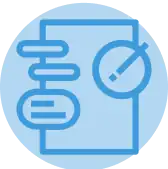
The top sections on a developer CV
- Contact Information to ensure easy communication.
- Technical Skills to highlight relevant expertise.
- Work Experience to showcase industry involvement.
- Education and Certifications to establish formal background.
- Projects and Portfolio to demonstrate practical experience.

What recruiters value on your CV:
- Highlight specific programming languages, frameworks, and technologies you are proficient in, emphasising those most relevant to the job you're applying for.
- Detail past projects and contributions using quantifiable achievements, such as efficiency gains or any notable features you developed.
- Include your involvement in any open-source projects or contributions to public code repositories like GitHub to showcase your commitment to collaborative development.
- Focus on your problem-solving skills and provide examples of innovative solutions you've devised or complex challenges you've overcome in your programming career.
- Mention any continuous learning or professional development activities, such as attending conferences, workshops, or completing relevant courses and certifications.
Recommended reads:
Making a good first impression with your developer CV header
Your typical CV header consists of Your typical CV header consists of contact details and a headline. Make sure to list your professional phone number, email address, and a link to your professional portfolio (or, alternatively, your LinkedIn profile). When writing your CV headline , ensure it's:
- tailored to the job you're applying for;
- highlights your unique value as a professional;
- concise, yet matches relevant job ad keywords.
You can, for examples, list your current job title or a particular skill as part of your headline. Now, if you decide on including your photo in your CV header, ensure it's a professional one, rather than one from your graduation or night out. You may happen to have plenty more questions on how to make best the use of your CV headline. We'll help you with some real-world examples, below.

Examples of good CV headlines for developer:
- Senior Software Engineer | Agile Methodologies | Cloud Solutions Expert | CI/CD | 10+ Years Experience
- Junior Web Developer | Full-Stack Aptitude | JavaScript & React Enthusiast | Certified Scrum Master | 2 Years Experience
- Lead Android Developer | Mobile Innovation | Kotlin Specialist | User-Centric Design | 8 Years Industry Insight
- Mid-Level Python Developer | Data Analysis & AI Focus | Flask & Django Proficiency | 5 Years Practical Knowledge
- Senior DevOps Engineer | Infrastructure Automation | AWS Certified | Kubernetes & Docker | 12 Years Progressive Experience
- Full-Stack Developer | MERN Stack | Agile & Lean Principles | Scalable Web Architecture | 7 Years Crafting Code
Catching recruiters' attention with your developer CV summary or objective
Located closer to the top of your CV, both the summary and objective are no more than five sentences long and serve as an introduction to your experience. What is more, you could use either to entice recruiters to read on. Select the:
- Summary, if you happen to have plenty of relevant experience. Feature your most impressive accomplishments and up to three skills that are relevant to the job you're applying for;
- Objective, if you're just starting your career off. Provide your career goals and answer how you see the role you are applying for will match your professional growth.
Judging which one you need to add to your developer CV may at times seem difficult. That’s why you need to check out how professionals, with similar to your experience, have written their summary or objective, in the examples below:

CV summaries for a developer job:
- Seasoned software engineer with over a decade of experience in the tech industry, specialising in full-stack development using JavaScript, React, and Node.js. Recognised for leading the successful launch of a scalable e-commerce platform that increased company revenue by 30% within the first quarter of its inception.
- Adept mobile application developer with 7 years of experience in crafting intuitive Android apps using Kotlin and Java. Pioneered a cross-functional team in the delivery of an award-winning health and fitness app that garnered over a million downloads and a 4.5-star rating on the Google Play Store.
- Emerging from a career in financial analysis, an astute professional with profound quantitative skills now pursuing a transformative path into software development. Brings to the table robust analytical abilities and a fervent commitment to learning programming languages like Python and C# to solve complex problems in a new realm.
- Dynamic marketing strategist transitioning into the tech industry with a focus on user experience design. Expertise in customer journey mapping and data-driven decision-making, now seeking to leverage a passion for technology by developing user-centric interfaces and experiences with a strong grasp of HTML, CSS, and JavaScript fundamentals.
- Aspiring software developer with a palpable zeal for technology and problem-solving. Desirous to apply my foundational knowledge in Python and Java, coupled with a recent certification in Full Stack Web Development, to architect robust software solutions that propel business innovation and growth.
- Eager to embark on a career in game development, bringing forth a lifelong passion for gaming combined with self-taught Unity and C# programming skills. Keen to leverage academic projects and personal game prototypes to contribute to creating engaging and immersive game experiences.
The best formula for your developer CV experience section
The CV experience section is the space where many candidates go wrong by merely listing their work history and duties. Don't do that. Instead, use the job description to better understand what matters most for the role and integrate these keywords across your CV. Thus, you should focus on:
- showcasing your accomplishments to hint that you're results-oriented;
- highlighting your skill set by integrating job keywords, technologies, and transferrable skills in your experience bullets;
- listing your roles in reverse chronological order, starting with the latest and most senior, to hint at how you have grown your career;
- featuring metrics, in the form of percentage, numbers, etc. to make your success more tangible.
When writing each experience bullet, start with a strong, actionable verb, then follow it up with a skill, accomplishment, or metric. Use these professional examples to perfect your CV experience section:

Best practices for your CV's work experience section
- Quantify your achievements where possible, such as "Developed a feature that improved app performance by 20%," to demonstrate the impact of your contributions.
- Highlight key technologies used in each role with phrases like "Implemented responsive designs with HTML5, CSS3, and JavaScript," to show your technical expertise.
- Describe projects worked on in terms of problem, solution, and outcome, like "Led a team to create a custom CMS by identifying client needs, developing a tailored solution, and enhancing content management efficiency by 35%."
- Include any experience with modern development methodologies, for instance, "Adopted Agile workflows, increasing team sprint delivery rate by 40%."
- Focus on collaboration and teamwork by citing instances such as "Partnered with cross-functional teams to streamline the deployment process, cutting release times by half."
- Mention any open-source contributions or personal projects that showcase additional skills, for example, "Contributed to open-source projects such as [Project Name], strengthening my expertise in [Technology]."
- Detail experience with version control systems like "Managed version control with Git, reducing code conflicts and rollbacks, thus improving codebase stability."
- Point out problem-solving capabilities with specifics such as "Resolved critical system crash incidents, slashing downtime from hours to minutes."
- Address experience in code reviews and adhering to coding standards with "Enforced best practices through rigorous code reviews, maintaining high standards for a 10+ developer team."
- Led the development of a new React-based single-page application that improved the user experience for over 500,000 customers.
- Optimised application performance leading to a 30% decrease in loading times and a 20% reduction in server costs.
- Mentored a team of 5 junior developers, increasing the team's overall productivity by 40% through best practice training and code reviews.
- Implemented a microservices architecture for a large-scale financial platform, handling over £20M in transactions per month.
- Developed and managed a CI/CD pipeline using Jenkins and Docker, reducing the release cycle time from 4 weeks to 1 week.
- Created an innovative feature for the internal CRM that boosted sales team productivity by 25%.
- Engineered a bespoke inventory management application using Node.js and MongoDB, supporting a 15% increase in operational efficiency.
- Integrated third-party APIs into the existing system that expanded customer payment options and increased completed transactions by 20%.
- Initiated unit testing practices which reduced critical bugs at launch by 95%.
- Developed a custom Java application for real-time data analysis which processed over 1TB of data daily.
- Collaborated cross-functionally to gather requirements, resulting in the delivery of enhanced features that raised customer satisfaction by 30%.
- Automated repetitive tasks using Java-based scripts, saving the team approximately 200 hours of manual work per year.
- Designed and launched a cross-platform mobile application using Xamarin that was downloaded over 100,000 times in the first six months.
- Involved in the end-to-end lifecycle of feature development, from conception to deployment and monitoring user engagement metrics.
- Improved the codebase maintainability by introducing modular programming practices and reducing technical debt by 40%.
- Spearheaded the design of a new SQL database schema that enhanced data retrieval times by 50% for critical business reports.
- Implemented robust data backup and recovery protocols, ensuring 99.9% data integrity and high availability of business-critical systems.
- Conducted extensive data analysis and reporting functions that supported strategic business decisions and contributed to a 10% increase in annual revenue.
- Completed an immersive development project, building a fully responsive website that achieved a 98% customer satisfaction rate.
- Collaborated with the design team to implement UI/UX best practices which resulted in a 40% increase in website traffic.
- Rapidly fixed bugs and performed troubleshooting tasks, contributing to a stable and reliable user experience.
- Assisted in the development of a new feature for an established codebase, leading to a 15% increase in user engagement.
- Supported the team in code refactoring efforts, which improved system performance and scalability, handling 10,000+ concurrent users.
- Participated in weekly agile sprint meetings, providing insights that consistently helped in meeting deployment deadlines.
Swapping your professional experience (when you have none) with skills and more
Never underestimate the importance of relevancе when it comes to your developer CV. Even if you don't happen to have much or any standard (full-time contract) professional experience, this doesn't mean you shouldn't apply for the role. Instead of a bespoke CV experience section:
- Showcase more prominently any internships, part-time roles, and volunteer experience that are applicable to the role and have taught you job-crucial skills;
- Feature a strengths or achievements section with your transferrable skills or talents you've obtained thanks to your work or life experience;
- Write an objective statement that clearly outlines your values as a candidate and defines your career ambitions;
- List your education or certificates that match the job profile closer to the top of your CV.
Recommended reads:

PRO TIP
If applicable, briefly mention a situation where things didn’t go as planned and what you learned from it, demonstrating your ability to learn and adapt.
Describing your unique skill set using both hard skills and soft skills
Your developer CV provides you with the perfect opportunity to spotlight your talents, and at the same time - to pass any form of assessment. Focusing on your skill set across different CV sections is the way to go, as this would provide you with an opportunity to quantify your achievements and successes. There's one common, very simple mistake, which candidates tend to make at this stage. Short on time, they tend to hurry and mess up the spelling of some of the key technologies, skills, and keywords. Copy and paste the particular skill directly from the job requirement to your CV to pass the Applicant Tracker System (ATS) assessment. Now, your CV skills are divided into:
- Technical or hard skills, describing your comfort level with technologies (software and hardware). List your aptitude by curating your certifications, on the work success in the experience section, and technical projects. Use the dedicated skills section to provide recruiters with up to twelve technologies, that match the job requirements, and you're capable of using.
- People or soft skills provide you with an excellent background to communicate, work within a team, solve problems. Don't just copy-paste that you're a "leader" or excel at "analysis". Instead, provide tangible metrics that define your success inusing the particular skill within the strengths, achievements, summary/ objective sections.
Top skills for your developer CV:
Programming Languages (e.g., JavaScript, Python, Java, C#)
Web Development (HTML, CSS, JavaScript)
Frameworks (e.g., React, Angular, Vue.js, .NET, Django)
Database Management (SQL, NoSQL, MongoDB, MySQL, PostgreSQL)
Version Control (Git, SVN, Mercurial)
API Development & Integration (REST, SOAP, GraphQL)
Cloud Services (AWS, Azure, GCP)
Containerisation (Docker, Kubernetes)
Software Testing (Unit, Integration, End-to-End)
Agile Software Development Methodologies
Problem-Solving
Teamwork
Communication
Adaptability
Time Management
Attention to Detail
Creativity
Critical Thinking
Perseverance
Continuous Learning

PRO TIP
If there's a noticeable gap in your skillset for the role you're applying for, mention any steps you're taking to acquire these skills, such as online courses or self-study.
Listing your university education and certificates on your developer CV
The best proof of your technical capabilities would be your education and certifications sections. Your education should list all of your relevant university degrees, followed up by their start and completion dates. Make sure to also include the name of the university/-ies you graduated from. If you happen to have less professional experience (or you deem it would be impressive and relevant to your application), spotlight in the education section:
- that you were awarded a "First" degree;
- industry-specific coursework and projects;
- extracurricular clubs, societies, and activities.
When selecting your certificates, first ask yourself how applicable they'd be to the role. Ater your initial assessment, write the certificate and institution name. Don't miss out on including the completion date. In the below panel, we've curated relevant examples of industry-leading certificates.

PRO TIP
If there's a noticeable gap in your skillset for the role you're applying for, mention any steps you're taking to acquire these skills, such as online courses or self-study.
Recommended reads:
Key takeaways
Write your professional developer CV by studying and understanding what the role expectations are. You should next:
- Focus on tailoring your content to answer specific requirements by integrating advert keywords through various CV sections;
- Balance your technical know-how with your personal skills to showcase what the unique value would be of working with you;
- Ensure your CV grammar and spelling (especially of your key information and contact details) is correct;
- Write a CV summary, if your experience is relevant, and an objective, if your career ambitions are more impressive;
- Use active language by including strong, action verbs across your experience, summary/objective, achievements sections.
